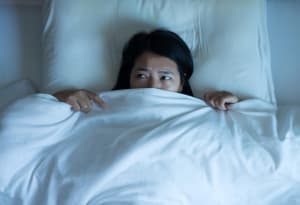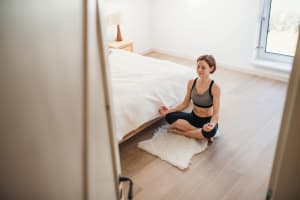What Is Sleep Paralysis?
 Throughout the ages, sleep paralysis has been attributed to the likes of demons, aliens and even the devil himself. Before the advent of modern medicine and the creation of research tools that have allowed us a scientific understanding of brain function, it’s not hard to see why this was the case.
Throughout the ages, sleep paralysis has been attributed to the likes of demons, aliens and even the devil himself. Before the advent of modern medicine and the creation of research tools that have allowed us a scientific understanding of brain function, it’s not hard to see why this was the case.
Sleep paralysis is one of the most disconcerting, terrifying experiences a sleeper can have. In its strange blend of sleep and wakefulness, people feel powerless and scared, unable to physically control their own bodies. Even with a 21st century understanding of why and how this phenomenon affects certain individuals, sleep paralysis can still feel like the work of a mystical force.
So what is really going on when we wake up unable to move or sense danger? What causes sleep paralysis? Can anything be done to prevent it? Is sleep paralysis a symptom of a more serious underlying condition?
There are two main kinds of sleep paralysis
Sleep paralysis can be broken down into two distinct types: predormital and postdormital. Predormital paralysis occurs a person is falling asleep and slowly relaxes, and postdormital paralysis occurs as one is waking up.
Both forms of the disorder are characterized by the same symptoms. According to the UK’s National Health Services, during an episode of sleep paralysis you may feel:
- awake but unable to move, speak or open your eyes
- like someone is in your room
- like something is pushing you down
- intense fear
These episodes can last for several minutes. Some studies suggest that this disorder is very rare, with just over 6% of people reporting that they have experienced the phenom in their lifetime. While less than 1% of people reporting having episodes once a week. However, other studies have estimated that up to one-third of adults have experienced sleep paralysis at least once.
Sleep paralysis is a form of parasomnia
 Like sleepwalking, night terrors, confusional arousal, hallucinations, and others, sleep paralysis belongs to a broad category of disorders known as parasomnias.
Like sleepwalking, night terrors, confusional arousal, hallucinations, and others, sleep paralysis belongs to a broad category of disorders known as parasomnias.
These conditions are characterized by unwanted physical activities and behaviors that occur when our bodies and minds enter an abnormal state somewhere between sleep and wakefulness.
During the course of a normal night in bed, our body cycles through discrete stages, marked by slightly different brain and body functions. This is known as the sleep cycle. Though the term parasomnia summarizes a broad category of different behaviors, all of them take place when people get “caught” in between discrete stages of the cycle and become partially awake.
How it is linked to REM
Without getting too deep into the specifics of the different stages of sleep, there are broadly two categories known as rapid eye movement (REM) and non-rapid eye movement (NREM). Sleep paralysis is a REM type of parasomnia, meaning that it affects individuals as they enter into, or are already in, the REM stage.
During this time, dreams are more common and more vivid. Because of this, the body naturally “paralyzes” its muscles so that sleepers cannot act out their dreams in the middle of the night. This freezing of the muscles is responsible for the immobile sensation associated with paralysis.
Causes of sleep paralysis
While there is no clear cut “cause” of sleep paralysis, sleep researchers have linked this parasomnia with certain triggers and other conditions. Significant factors that can contribute to SP include:
- Unhealthy or irregular sleep patterns: Not getting enough sleep, or getting it in irregular intervals can lead to SP. Generally speaking, the less routine your nighttime patterns are, the more susceptible to certain disorders you become.
- Excess stress: High levels of stress can lead to insomnia, which in turn has been linked to episodes of SP.
- Mental health disorders: Some studies have shown that the prevalence of SP is higher among populations that suffer from mental health disorders.
- Other sleep disorders: Sleep paralysis has been linked to several other disorders, including narcolepsy, insomnia, and restless legs syndrome (RLS), among others.
- Certain medications: Some medications might lead to episodes of paralysis, especially those taken for the treatment of ADHD.
- Substance abuse: Along with many other sleep disorders, there seems to be a link between substance abuse and sleep paralysis, though more research is needed to establish a clear causal link between the two.
This phenomenon can happen to any person regardless of age or gender, though the first experiences with the disorder typically occur during the teenage years.

Treatment Options
Often times, this paralysis occurs so infrequently that it does not require a formal diagnosis and treatment by medical professionals. However, if episodes become frequent, or especially upsetting, there are some treatment options available to combat the episodes.
- Improve your sleep hygiene: Try to get six-to-eight hours of rest every night. As best you can, try to go to bed and wake at the same time to set a routine your body will naturally adjust to. Avoid alcohol, caffeine, and nicotine in the evenings, as well as electronics with blue light-emitting displays.
- Treat underlying conditions: The most important thing you can do is seek treatment for any conditions that might underpin sleep paralysis. Talk to your doctor if you suffer from other sleep disorders like insomnia or narcolepsy, or if you suspect you may have untreated mental health disorders like depression or bipolar disorder.
- Relieve stress before bedtime: Anything you can do that makes the journey into sleepless fraught will improve your chances of healthy uninterrupted rest. Try practicing meditation or yoga in the evening, or wind down with a bath and a good book. Avoid things like social media or checking emails.
- Talk to your doctor about medication and therapy options: If you take medication for any other condition, speak with your physician about possible side effects that may cause or exacerbate sleep paralysis. They might recommend that you change your prescription. In severe cases, some doctors might recommend cognitive behavioral therapy as treatment.
Leave a Reply